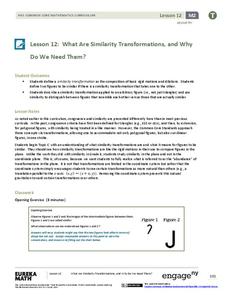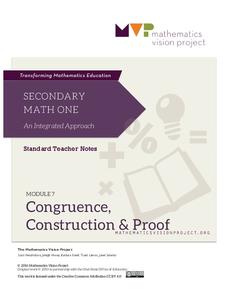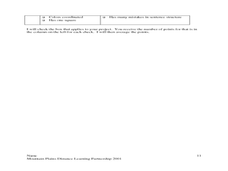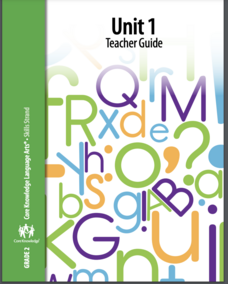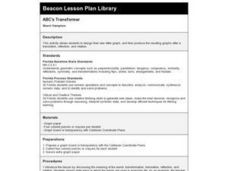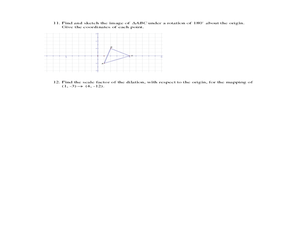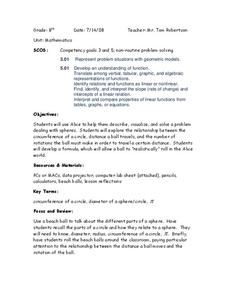EngageNY
What Are Similarity Transformations, and Why Do We Need Them?
It's time for your young artists to shine! Learners examine images to determine possible similarity transformations. They then provide a sequence of transformations that map one image to the next, or give an explanation why it is not...
EngageNY
Mid-Module Assessment Task - Precalculus (module 1)
Individuals show what they know about the geometric representations of complex numbers and linearity. Seventeen questions challenge them to demonstrate their knowledge of moduli and operations with complex numbers. The assessment is the...
EngageNY
End-of-Module Assessment Task — Precalculus (Module 1)
A transformational assessment determines how far pupils are advancing toward mastering complex and matrix standards. The assessment checks the learners' understanding of linear transformations, complex numbers and the complex plane,...
Virginia Department of Education
Quadratic Modeling
Use a one-stop resource for everything you'd possibly want to teach about quadratic functions and models. Scholars analyze key features of quadratic functions as well as transformations of functions through seven activities....
Chicago Botanic Garden
Seed Dispersal and Plant Migration
There are five methods of seed dispersal. They include gravity, mechanical, animal, water, and air. Scholars study seed dispersal in lesson five of the series of six. Through discussions, hands-on analysis of different seed types, and...
Mathematics Vision Project
Congruence, Construction and Proof
Learn about constructing figures, proofs, and transformations. The seventh unit in a course of nine makes the connections between geometric constructions, congruence, and proofs. Scholars learn to construct special quadrilaterals,...
GeoGebra
Leaping Lizards
Transform lizards onto different locations. The interactive provides a diagram of a lizard and several locations. Pupils use their knowledge of transformations to move the lizard to the different locations and use the tools of GeoGebra...
CCSS Math Activities
Smarter Balanced Sample Items: 8th Grade Math – Target G
Transform the thinking of transformations with six sample items that illustrate the first four standards in the eighth grade geometry domain. Items use the coordinate plane to transform figures and analyze the relationship of the figures...
Curated OER
Keeping in Shape
Third graders describe patterns in terms of reflection and rotation symmetry, and translations. They design and make a pattern which involves translation, reflection, or rotation. They demonstrate why a given tessellation covers the...
Curated OER
Quilt Squares
Learners research the history of the quilt in American History and view a PowerPoint Presentation. They create a quilt square with colored paper using polygons, transformations, rotations, and reflections on the computer and on a...
Curated OER
Tangram Puzzles
Students explore, experience and study recognizing and applying flips (reflections), slides (translations), and turns (rotations). They utilize spatial memory and spatial visualization skills to figure out what figures look like when...
Core Knowledge Foundation
Second Grade Skills Unit 1: The Cat Bandit
For twenty-two lessons over five weeks, scholars practice sound-spelling correspondence, spelling patterns, tricky words, and reading decodable text. Assessments aid in small group formation and gauge comprehension. Lessons begin with a...
Curated OER
ABC's Transformer
Fourth graders design their own letter graph, and then produce the resulting graphs after a translation, reflection, and rotation. After a review of vocabulary, 4th graders create their graphs using crayons.
Curated OER
Transformation
Third graders investigate symmetry by reflecting objects in different angles. In this geometrical transformation lesson, 3rd graders define the terms translation, rotation and reflection in order to physically turn geometric...
Curated OER
M. C. Escher - Design - Math Integration
Students create a tessellations using rotation and translation. They also create a tessellation using reflection.
Curated OER
Determine the Coordinate of Transformations
Young scholars investigate transformation on a coordinate plane. In this geometry lesson, students identify pairs of coordinates and their location on the grid. They perform rotation and reflection of each polygon.
Curated OER
Lines of Symmetry
Fourth graders demonstrate lines of symmetry using polygons, pentominoes, and block letters of the alphabet. They describe, identify, and analyze characteristics and properties of geometric shapes.
Curated OER
Tessellation
Young scholars create an art piece incorporating tessellating shapes, translational symmetry, reflectional symmetry,and or rotational symmetry. They are asked if they know the definition of tessellation. If so, students are asked what...
Curated OER
Let the Matrix Do It
Students create a matrix of the vertices of a triangle and produce new matrices that dilate, translate, rotate, and reflect the original triangle. After multiplying each matrix by a new scale factor, they graph the new matrix and...
Curated OER
Transformations Homework
In this geometry worksheet, high schoolers transform a coordinate based on a reflection, translation, or dilation in order to obtain the image. There are 12 questions.
Curated OER
Introduction to Unit V-Transformations
Students investigate transformations. In this Algebra I/Geometry activity, students explore reflections, translations, rotations and dilations. The activity includes examples of transformations in art, architecture, and nature.
Curated OER
Circle Relationships
Students explore circles. In this geometry instructional activity, students explore the relationship between the circumference of a circle, the distance a ball travels, and the number of rotations the ball must make in order to travel a...
Curated OER
Geometry Exam
In this reflections and symmetry worksheet, students draw lines of symmetry in shapes and patterns and reflect letters over lines in graphs. Students complete 20 problems.
K20 LEARN
Words Before Blows: Julius Caesar
Scholars examine how Brutus and Mark Antony employ ethos, pathos, and logos in their speeches to persuade the angry crowd in Act 3, scene 2 of William Shakespeare's tragedy, Julius Caesar. To set the stage, groups first identify the...


